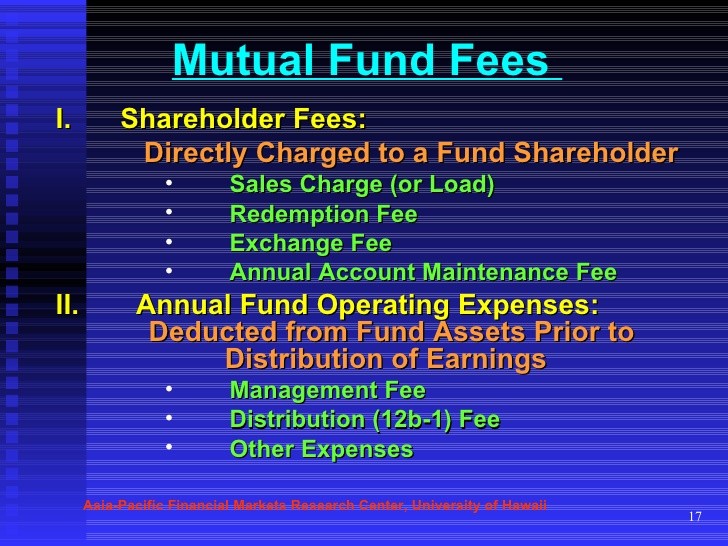Mutual fund fee reform coming
Post on: 30 Апрель, 2015 No Comment

Canadian regulators will be armed with new research in early 2015 that investor advocates hope will finally prompt a clampdown on the use of embedded commissions on mutual fund sales. The compensation method is one that some say can lead to biased advice and eat into long-term returns.
“We’re hopeful,” said Neil Gross, executive director of the Canadian Foundation for Advancement of Investor Rights.
FAIR Canada has long opposed such fees paid by mutual fund companies, often annually, to advisors who sell their funds.
Market watchdogs first raised the question in 2012 of whether these embedded fees, sometimes called trailing commissions or simply trailer fees, should be banned, as they have been in other jurisdictions such as the United Kingdom.
According to data already gathered by regulators, the contribution of these ongoing commissions to overall advisor compensation has grown over the years. And many investors don’t appear to fully understand the commissions or even know that they are being awarded.
Nevertheless, after several rounds of consultation and discussion, the Canadian Securities Administrators said in September that no action would be taken until two studies were completed.
The research will compile and review data on whether the payment of commissions influences fund sales, and assess whether advice and long-term investment outcomes change when investors pay fees directly to advisors, rather than paying indirectly through embedded trailer fees.
There’s already plenty of evidence of “a correlation” between the remuneration paid to the advisor and the flow of money into particular types of investments, says Mr. Gross, pointing to continued strong sales of mutual funds despite their high cost relative to exchange-traded funds.
“These costs add up and they make a big difference to net returns,” he said, adding that there often appears to be little correlation between fees paid and the advice received.
Evidence obtained through academic studies, if it backs up what investor advocates say, would bolster the case for change against heavy industry opposition, says Mr. Gross.
“If there’s an objective finding that the embedded commissions, the trailer commissions, have that kind of warping effect … then you have to look at [whether Canada should] be banning that type of embedded commissions the way it’s been banned in the U.K. and other places, and for the same reasons,” he said.
Investor advocates say such findings would also embolden calls for the standards of investment advice to be raised so advisors who deal with retail clients have to recommend investments that are in the client’s best interest, rather than merely suitable.
Proponents say the higher standard would automatically lead to fewer conflicts of interest between an advisor and client.
But the investment industry is opposed to this type of regulatory intervention. One of the principal arguments advanced by organizations such as the Investment Industry Association of Canada (IIAC) is that it isn’t necessary because new rules for disclosure are already in the works to give investors a much better understanding of how much they are paying advisors and how they are paying it.
These changes, which mandate that advisors clearly spell out what compensation advisors receive indirectly through arrangements with fund companies, are to be fully implemented by the middle of 2016.
However, in a move that concerns investor advocates, the investment industry is seeking an extension.
It’s unfair to allege that somehow … the industry is dragging its feet
Ian Russell, chief executive of the IIAC, says the request should not be seen as a delay tactic or a sign the industry isn’t prepared to be more transparent about fees. There is a legitimate need for more time to develop systems to comply with the new requirements, he said, adding that the financial demands and workload are difficult for firms that are struggling to keep up with other expensive new rules in the aftermath of the financial crisis.
“It’s unfair to allege that somehow … the industry is dragging its feet,” Mr. Russell said. “It’s not surprising. These are fairly complicated directives, and come at a difficult time for the industry.”
Vicken Kazazian, senior vice-president of the career sales force for individual insurance and wealth management at Sun Life Financial Canada, said his company supports the added disclosure, which falls under the umbrella of a regulatory overhaul called the Client Relationship Model.
Additional transparency and disclosure when the rules are fully phased in “will be very helpful to consumers and will assist advisors in building stronger relationships with their clients,” he said in an emailed statement.

Like many in the business of advising clients on investments, Mr. Kazazian urged regulators to take time to assess the impact of the new disclosure rules under the Client Relationship Model “before considering whether any other major regulatory changes … are necessary.
But it will be more than a year before regulators can even start to collect data on the full implementation, and nearly two years if the IIAC’s requested delay is granted, notes Mr. Gross.
That’s too long to wait, says the FAIR Canada executive, particularly since it has already been more than a decade since Canadian regulators began to consider stepping in to overhaul the rules.
Despite many false starts over the years, there are those who think change will come this time. Among them is Rob Sedran, a financial services analyst at CIBC World Markets, who wrote a report on trailer fees in October that was subtitled: The Meteor is Closer than You Think. In it, he discussed the global trend of banning trailer fees, and concluded that, in Canada, “a ban is coming, and sooner than many think.”
Mr. Sedran and his colleague Paul Holden followed up with a report in December that said Canadian regulators are likely to pay close attention to recently published results of a regulatory review of a trailer fee ban and advisor-standards reform in the U.K.
“Notwithstanding the views of many market participants about some of the disruptions that have occurred, the tone of the report suggests that the regulator seems rather pleased with the developments so far,” the analysts wrote.
Some people who track the industry suggest those results, combined with the spectre of new research from Canadian regulators in early 2015, could be enough to prompt changes within Canadian fund companies – even small ones – in an effort to get ahead of any reforms.
It has happened in the past, they note. A little more than a year ago, when it appeared regulators were revving up for a possible clampdown, some firms began to offer a new stream of low-fee mutual funds that were aimed at “self-directed” do-it-yourself investors.
Financial Post
bshecter@nationalpost.com
Twitter.com/BatPost














